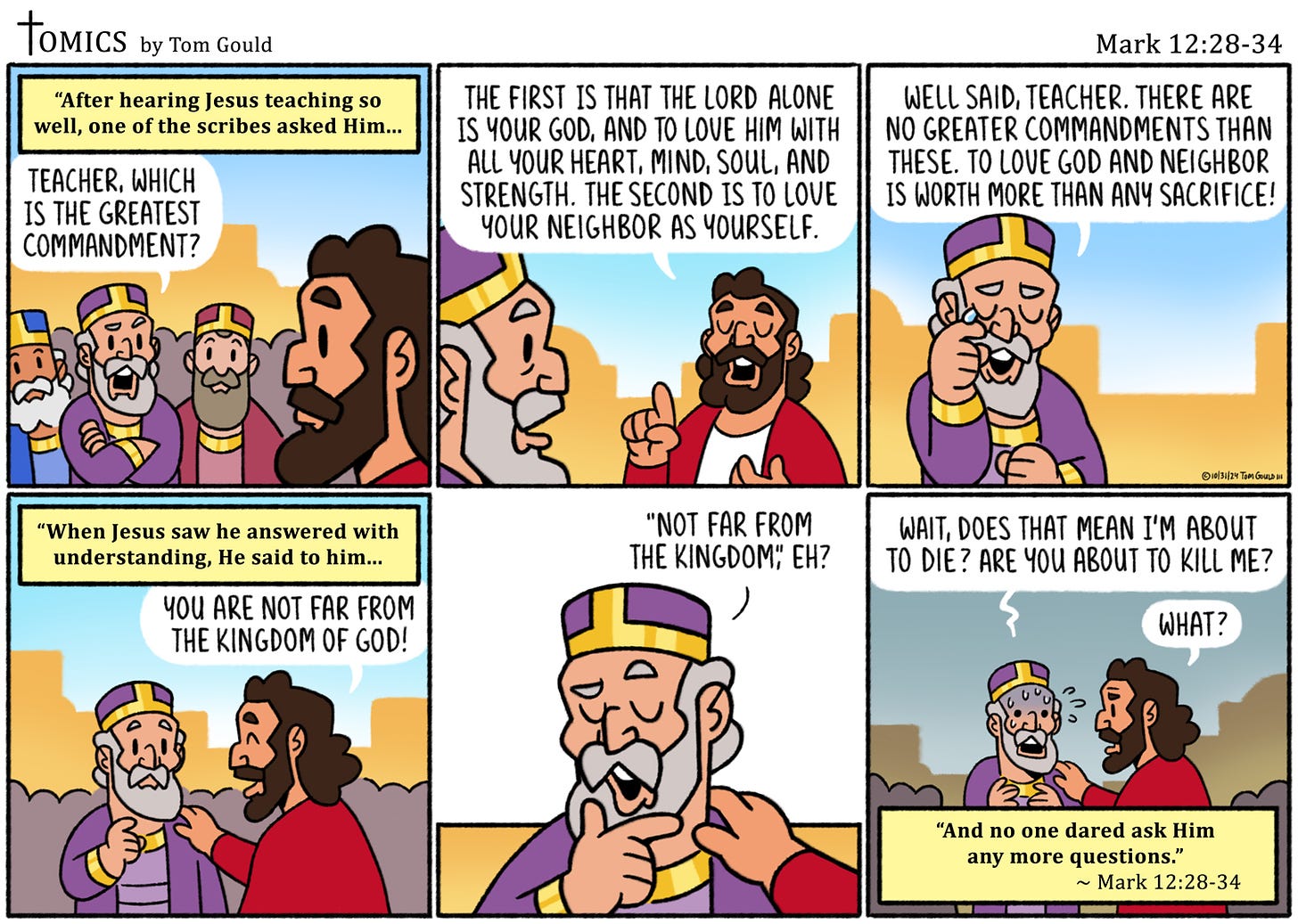The Tomics comic for today goes a little off the rails…
Reading I
Dt 6:2-6
Moses spoke to the people, saying: "Fear the LORD, your God, and keep, throughout the days of your lives, all his statutes and commandments which I enjoin on you, and thus have long life. Hear then, Israel, and be careful to observe them, that you may grow and prosper the more, in keeping with the promise of the LORD, the God of your fathers, to give you a land flowing with milk and honey.
"Hear, O Israel! The LORD is our God, the LORD alone! Therefore, you shall love the LORD, your God, with all your heart, and with all your soul, and with all your strength. Take to heart these words which I enjoin on you today."
God has to be the center of our lives, because He is the beginning of everything. That doesn’t mean we have to become monks who simply contemplate the goodness of the Lord all day long, though. As long as we don’t put anything above God, and understand that all the good things and people in our lives are from God, we have a right and proper understanding of the world.
Bishop Barron explains all of this better than I could—
Responsorial Psalm
Ps 18:2-3, 3-4, 47, 51
R. (2) I love you, Lord, my strength.
I love you, O LORD, my strength,
O LORD, my rock, my fortress, my deliverer.
R. I love you, Lord, my strength.
My God, my rock of refuge,
my shield, the horn of my salvation, my stronghold!
Praised be the LORD, I exclaim,
and I am safe from my enemies.
R. I love you, Lord, my strength.
The LORD lives! And blessed be my rock!
Extolled be God my savior.
You who gave great victories to your king
and showed kindness to your anointed.
R. I love you, Lord, my strength.
This is a psalm of thanksgiving for victory in a battle, but as I mentioned in my belated Halloween post, we also must face spiritual battles. We can rely on God for both.
Reading II
Heb 7:23-28
Brothers and sisters: The levitical priests were many because they were prevented by death from remaining in office, but Jesus, because he remains forever, has a priesthood that does not pass away. Therefore, he is always able to save those who approach God through him, since he lives forever to make intercession for them.
It was fitting that we should have such a high priest: holy, innocent, undefiled, separated from sinners, higher than the heavens. He has no need, as did the high priests, to offer sacrifice day after day, first for his own sins and then for those of the people; he did that once for all when he offered himself. For the law appoints men subject to weakness to be high priests, but the word of the oath, which was taken after the law, appoints a son, who has been made perfect forever.
The end of this reading is yet another passage often taken out of context—if Jesus sacrificed Himself “once for all,” why do we continue to offer the sacrifice of the mass? Catholic Answers has the, um, answer:
Hebrews teaches the atoning death of Christ was effective for the remission of sins and hence needed to be offer only once. But this speaks of what theologians call the “objective redemption.” It doesn’t mean that, since Jesus died for everyone, everyone will get to heaven. (That’s universalism.) The merits or the fruits of Christ’s death need to be applied to the individual.
When Catholic theologians talk about the Mass being a propitiatory sacrifice for the remission of sins, they mean, among other things, that the objective redemption which Christ’s sacrifice on the Cross merited is subjectively applied to the individual through the sacrifice of the Mass.
We continue to offer the mass1 to continue participating individually. We each, personally, get to be a part of the offering, and atone for our sins. This can only be done with Jesus’ sacrifice, as Paul says, because Jesus lives forever.
Alleluia
Jn 14:23
R. Alleluia, alleluia.
Whoever loves me will keep my word, says the Lord;
and my father will love him and we will come to him.
R. Alleluia, alleluia.
Jesus says this in the context of Jude asking Him why He revealed Himself to the Apostles and not the rest of the world. Jesus assures him that having a correct understanding and proper ordering of priorities, anyone can love God and be accepted.
Gospel
Mk 12:28b-34
One of the scribes came to Jesus and asked him, "Which is the first of all the commandments?"
Jesus replied, "The first is this: Hear, O Israel! The Lord our God is Lord alone! You shall love the Lord your God with all your heart, with all your soul, with all your mind, and with all your strength. The second is this: You shall love your neighbor as yourself. There is no other commandment greater than these."
The scribe said to him, "Well said, teacher. You are right in saying, 'He is One and there is no other than he.' And 'to love him with all your heart, with all your understanding, with all your strength, and to love your neighbor as yourself' is worth more than all burnt offerings and sacrifices."
And when Jesus saw that he answered with understanding, he said to him, "You are not far from the kingdom of God."
And no one dared to ask him any more questions.
As I mentioned a couple of weeks ago, Mark’s is the shortest Gospel,2 so it’s notable when he includes details that the other evangelists omit in parallel stories. In Matthew’s version,3 there’s no mention of the scribe’s reaction. This is another indication that Mark was probably from the upper strata of society. He knew these pillars of society. So when one of them has a conversion and sees Jesus for who he is, Mark takes note.
Jesus is often at odds with the scribes and pharisees, but they are not beyond salvation and without hope. Anyone can have a change of heart, if they allow themselves to place God first.
And it is “we,” not just the priest.
You may have noticed we read a lot of Mark during Year B, the current year of the lectionary calendar.




